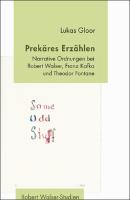Prekäres Erzählen
Narrative Ordnungen bei Robert Walser, Franz Kafka und Theodor Fontane
| dc.contributor.author | Gloor, Lukas | |
| dc.date.accessioned | 2020-10-13T12:27:45Z | |
| dc.date.available | 2020-10-13T12:27:45Z | |
| dc.date.issued | 2020 | |
| dc.identifier | ONIX_20201013_9783846765593_4 | |
| dc.identifier | OCN: 1200514638 | |
| dc.identifier.uri | https://library.oapen.org/handle/20.500.12657/42532 | |
| dc.language | German | |
| dc.relation.ispartofseries | Robert Walser - Studien | |
| dc.subject.classification | thema EDItEUR::D Biography, Literature and Literary studies::DS Literature: history and criticism::DSK Literary studies: fiction, novelists and prose writers | en_US |
| dc.subject.other | Literary studies: fiction, novelists & prose writers | |
| dc.title | Prekäres Erzählen | |
| dc.title.alternative | Narrative Ordnungen bei Robert Walser, Franz Kafka und Theodor Fontane | |
| dc.type | book | |
| oapen.abstract.otherlanguage | Robert Walser, Franz Kafka, and Theodor Fontane pursue a precarious narration in the context of the problem of order in modernity. While Fontane’s Der Stechlin attempts to put the rampant ambivalence in its place by means of an orderly narration, Walser liberates narration: in a digressive and performative process, he cross-fades contradictory patterns. Finally, Kafka demonstrates in The Burrow how all differentiation collapses and how narrative, in a paradoxical way, represents its own impossibility. Precarious narration, the book argues, is not a deficit narrative but a genuine form of narration. | |
| oapen.identifier.doi | 10.30965/9783846765593 | |
| oapen.relation.isPublishedBy | af16fd4b-42a1-46ed-82e8-c5e880252026 | |
| oapen.relation.isFundedBy | 07f61e34-5b96-49f0-9860-c87dd8228f26 | |
| oapen.collection | Swiss National Science Foundation (SNF) | |
| oapen.imprint | Wilhelm Fink | |
| oapen.series.number | 5 | |
| oapen.pages | 311 | |
| oapen.grant.number | 10BP12_193560 |

